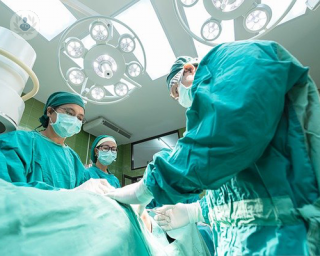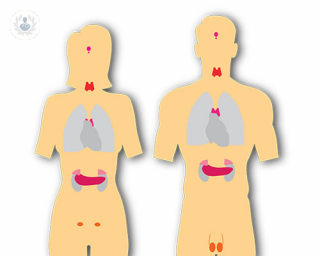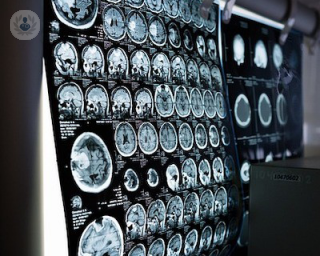Cushing's syndrome
Dr John Bolodeoku - Endocrinology, diabetes & metabolism
Created on: 04-30-2016
Updated on: 04-26-2023
Edited by: Carlota Pano
What is Cushing's syndrome?
Cushing's syndrome is a rare, progressive disease that occurs due to chronic and excessive production of the hormone cortisol. Cortisol is naturally synthesised (produced) in the human body by the adrenal glands and helps with regulating blood pressure, converting food into energy, controlling the immune system’s inflammatory response and handling stress. If left untreated, Cushing’s syndrome can cause problems.

How are cortisol levels normally controlled?
The production of cortisol is controlled by the hypothalamus, the pituitary gland and the adrenal gland. When cortisol levels are low, the hypothalamus releases corticotrophin-releasing hormone (CRH) into the blood, which stimulates the pituitary gland to secrete another hormone, called the adrenocorticotrophic hormone (ACTH). ACTH is released and then carried to the adrenal glands, where it triggers the production of cortisol by the adrenal glands.
Cortisol levels in the body start to rise, blocking the secretion of CRH and ACTH once cortisol peaks at its highest possible level for healthy body function. This peak will usually occur in the early morning. After this point, ACTH levels will fall, causing cortisol levels to decline.
Cortisol levels will vary throughout the day, but normal function of the hypothalamus and the pituitary and adrenal glands will keep cortisol levels within a certain range, which is never too low or never too high.
What are the symptoms of Cushing's syndrome?
The disease presents either over time or suddenly. The most important change is weight gain and increased body fatty tissue, caused by a redistribution and accumulated deposition of fat. This may appear as:
- A swollen and puffy face
- A fatty 'hump' between the shoulders at the base of the neck, in the upper back
- Fat on the chest and the stomach
Other symptoms of Cushing’s syndrome include:
- Purple or pink stretch marks on the thighs, abdomen, breasts and arms
- Skin that is thin and fragile, easily bruised
- Fatigue
- Acne
- Muscle weakness
- High blood pressure
- Cuts and infections that heal slowly
- Bone loss (osteoporosis), as elevated levels of cortisol directly inhibit bone formation and affect the hormone of growth
- Type 2 diabetes, as blood glucose levels rise
- Low libido
- Erectile dysfunction
- Changes in mood, anxiety or depression
- Issues with fertility such as absent or irregular menstrual periods
- Hirsutism (in women), due to the overproduction of androgen hormones in the blood
How is Cushing's syndrome diagnosed?
The diagnosis of Cushing’s syndrome can be difficult, particularly if you have not been taking steroid medication. This is because the symptoms of Cushing’s syndrome can be similar to other conditions such as polycystic ovary syndrome, depression and eating disorders. This can delay diagnosis even several years.
If Cushing's syndrome is suspected after a physical examination, the cortisol level in your body will be measured through a blood, urine and saliva test, as well as an inferior petrosal sinus sampling (a diagnosing procedure which samples the petrosal sinuses veins to test for ACTH) and imaging tests like an MRI or a CT scan.
What are the causes of Cushing's syndrome?
The main cause of Cushing’s syndrome is an overproduction of the hormone cortisol. This commonly results from the use of corticosteroid medications over a long period of time (they contain an artificial version of cortisol in them), but it can also result from:
- High levels of stress
- Malnutrition
- Alcoholism
- Depression and panic disorders
- Intensive athletic training
- Tumours (pituitary gland, adrenal gland)
Cushing's syndrome usually develops in adults aged 20 to 50, with women being three times more likely to be affected.
Is Cushing's syndrome genetic?
Although it is rare, Cushing's syndrome can result from an inherited predisposition to develop small tumours on the adrenal glands, which can affect the levels of cortisol and lead to Cushing's syndrome.
Can Cushing’s syndrome be prevented?
The only way to prevent Cushing’s syndrome caused by corticosteroid medication is to avoid taking this type of medication, if possible.
Treatments for Cushing's syndrome
Treatment for Cushing’s syndrome aims to control the levels of cortisol in the patient’s body, returning these levels to normal. This can be achieved by lowering the dose of certain medications, but if the cause is a tumour, for example, this will need to be treated by either surgery, medication, radiotherapy, or chemotherapy.
With surgery, a surgeon will aim to remove a tumour completely. After the surgery, most patients will have adrenal insufficiency, which will unable them to produce cortisol for a period of time. Cortisol replacement medications will then need to be taken, to provide your body with the correct amount of cortisol. With time, your body will return to adequate adrenal production of cortisol hormones. However, the whole process can take up to a year or longer.
Radiotherapy is recommended for people who can't undergo surgery and for people whose tumour wasn't completely removed during surgery. Radiation ccan be administered either in small doses over a six-week period or through stereotactic radiotherapy, a one-off large radiation dose, to destroy the tumour. Chemotherapy may be advised if a tumour is cancerous or if it has spread to other areas of the body.
Medications may be used to decrease and manage the effect of cortisol in the body, if surgery, radiotherapy and chemotherapy do not work. In addition, they may also be used prior to surgery to treat severe Cushing's syndrome symptoms and minimise surgical risk. Treatment with medication may not improve all of the symptoms of excess cortisol, however.
If none of these treatments work, your doctor may recommend for your adrenal glands to be surgically removed (a procedure called a bilateral adrenalectomy). This is a final procedure which will treat the overproduction of cortisol, but which will require you to take replacement medications for life.
What is the prognosis of Cushing's syndrome?
Most symptoms will usually disappear or significantly improve within a year, if treatment addresses the cause of the disease. However, Cushing's syndrome will return (for example, if a tumour recurs) in 25 per cent of cases. In these cases, further treatment will be necessary.
Which specialist treats Cushing’s syndrome?
Cushing's syndrome is usually treated by endocrinologists.
What can I eat and drink with Cushing's syndrome?
If you have Cushing's syndrome, small lifestyle changes can help you to manage and prevent the progression of symptoms, including:
- Increasing your intake of calcium and vitamin D
- Stopping smoking
- Decreasing or eliminating alcohol
- Exercising regularly, for example, swimming or cycling - but avoiding high impact activities such as running or weight lifting which place stress on the body. This is to reduce the risk of falls and possible bone fracture.
- Reducing your sodium intake
- Controlling your blood sugar levels
- Eating protein-rich food
What is the difference between Cushing's syndrome and Cushing disease?
While both diseases develop due to elevated levels of cortisol in the body, Cushing's disease is a form of Cushing's syndrome that occurs when a pituitary adenoma (a benign tumour) in the pituitary gland causes the gland to secrete excess ACTH. Too much ACTH in the body then stimulates the adrenal glands to make excess cortisol.
Unlike Cushing's syndrome (which can happen due to several reasons), Cushing disease only develops due to a tumour or growth in the pituitary gland.








